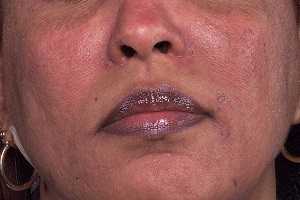Rosacea is a chronic skin condition that primarily affects the face, causing redness, visible blood vessels, and sometimes pimples or bumps. While there is no known cure for rosacea, there are various treatment options available to manage its symptoms and minimize flare-ups. Here are some common treatments for rosacea:
- Topical Medications: Prescription topical creams or gels, such as metronidazole, azelaic acid, or brimonidine, can help reduce redness, inflammation, and acne-like bumps associated with rosacea. These medications are typically applied directly to the affected areas.
- Oral Medications: In more severe cases, oral medications like antibiotics (e.g., tetracycline, doxycycline) may be prescribed to reduce inflammation and control the symptoms of rosacea. These medications are typically used for a limited period to bring the condition under control.
- Laser or Light Therapy: Laser and intense pulsed light (IPL) therapies can help reduce redness, visible blood vessels, and other signs of rosacea. These treatments target blood vessels and reduce their visibility. Multiple sessions may be required for optimal results.
- Skincare Routine: Gentle skincare practices are essential for managing rosacea. This includes using a mild, non-irritating cleanser and moisturizer suitable for sensitive skin. Avoiding harsh products, exfoliation, and rubbing the face vigorously can help prevent flare-ups.
- Sun Protection: Protecting the skin from the sun is crucial for individuals with rosacea. Sunscreen with a high SPF, wearing wide-brimmed hats, and seeking shade can help minimize sun-related flare-ups.
- Lifestyle and Trigger Management: Identifying and avoiding triggers that worsen rosacea symptoms is important. Common triggers include spicy foods, hot beverages, alcohol, temperature extremes, stress, and certain skincare products. Managing stress levels and incorporating stress-reducing techniques may also be beneficial.
- Professional Guidance: It is recommended to consult with a dermatologist who specializes in rosacea to receive an accurate diagnosis and personalized treatment plan. They can assess the severity of your rosacea and guide you on the most appropriate treatment options for your specific needs.
Remember, what works for one person may not work for another, so it’s essential to find the treatment or combination of treatments that work best for you. Be patient and consistent with your skincare routine and follow the advice of your healthcare professional to effectively manage rosacea.

